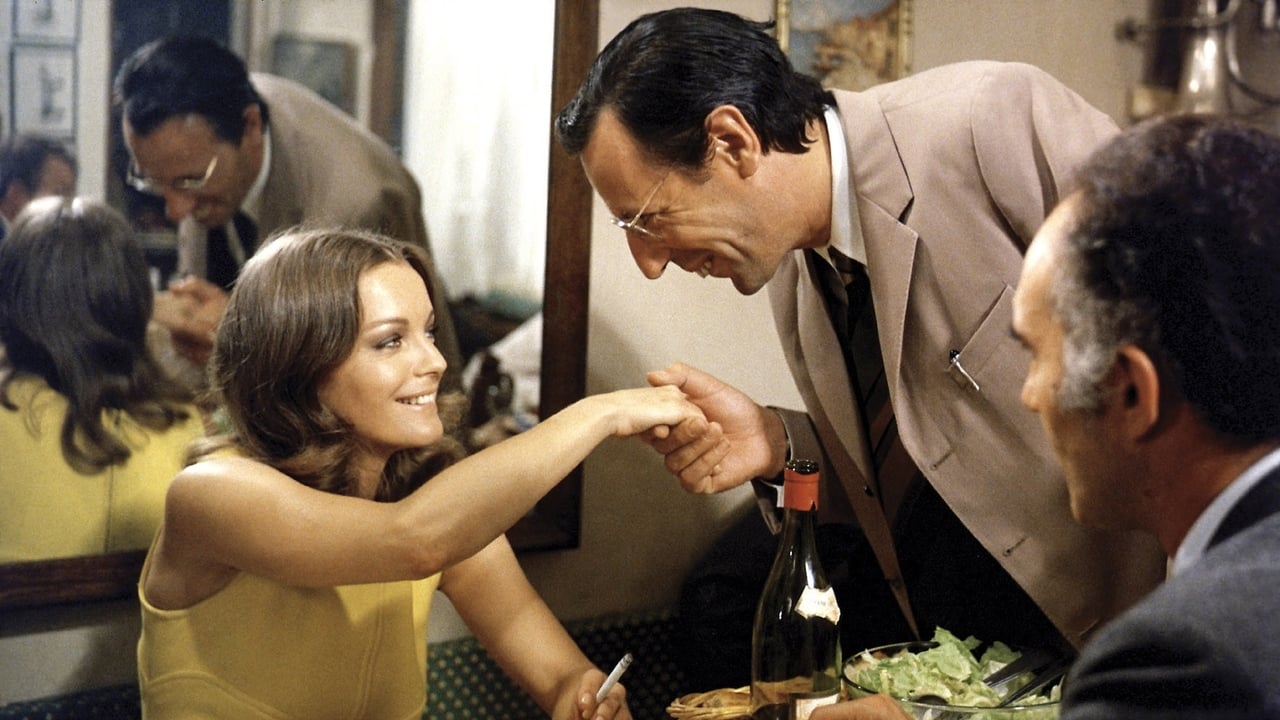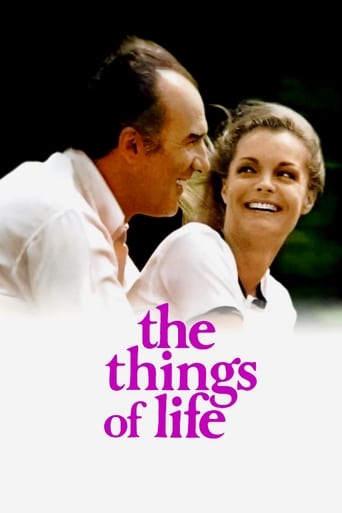

Load of rubbish!!
... View MoreAll of these films share one commonality, that being a kind of emotional center that humanizes a cast of monsters.
... View MoreThis is one of the best movies I’ve seen in a very long time. You have to go and see this on the big screen.
... View MoreStory: It's very simple but honestly that is fine.
... View MoreFrench films are famous for their depiction of minor incidents which converge at a larger point to make up the most of what happens in the lives of people. This helps viewers to have a better idea of protagonists' lives. French director Claude Sautet chose to base his film on this premise as he films the personal as well as professional lives of a successful yet unhappy man. From a career point of view, actor Michel Piccoli is shown as somebody doing well in life as he is appreciated by everybody around him. However, his personal life is in turmoil as he is unable to decide between his wife and his mistress. As he is about to solve this dilemma, a tragedy unfolds in his life. This is hardly the description of an original story but what makes the film interesting is how it has been shot. Apart from describing in detail minor incidents related to the lives of protagonists, Claude Sautet has used all his imagination to film the accident scene which occupies a large part of this film's screen space. Finally, once the film is over, some viewers might be tempted to call it the most important moment of the film.
... View MoreAbove all the memories, there is one with a definite form... mostly in the Love we take to our graves. This love becomes the wellspring of our final images- our reconciliation with longings and regrets. Les Choses De la Vie is centered around a tragedy, an automobile accident.Shot in dazzling slow motion and multiple camera angles, the accident is the Spine on which the Book of Michel (Michel Piccoli) rests. A lot has been mentioned about the simplicity of the story but it is the construction and arrangement of plot elements that leaves a lump in one's throat.A cast that boasts a combined filmography of everyone from Fellini, Tavernier, Antonioni and Demy to Chahine, is the Coup that director Sautet landed. The Film opens with shots of a car in flames, the victim, witnesses and bystanders. The accident is reconstructed in parallel with Michel's life. He is a man of means, a successful architect on the verge of moving to another country. His young mistress Helene(Romy Schneider)wants a house on an island unused by others unlike the one owned by his wife Catherine. Catherine (Lea Massari)is also a colleague who has her own lover. The first hint of searing emotion involves the mention of a favorite family dog, the last the family had. Michel's son Bertrand immerses himself in inventing motorized circuitry that can replace pets in people's homes. What's left between father and son except gratuitous enquiries? This thread is picked up to show a conflict between Michel and Helene at a restaurant. Will Michel chose a vacation with his son over Helene's pressing need to leave the country? Life's like a corvee to work and only a 'young wine that rarely travels' can make up for 32 years of friendship changing for a woman. Michel's love is questioned even as he acknowledges Helene's Physical hold on him. An especially evocative scene involves the engine and the road.. the only true sounds in a difficult silence as they drive back from a party. The lines are pithy and loaded with identity. Sample this.... "You love me 'cause I'm here. You'll be lost if you cross the street." Michel drops Helene off and journeys on, perhaps on an adventure. He has nothing to say because he's still clutching on to civility. The rain brings it all on, the music soars. Michel is lost in his reminiscences. A flood of sweet memories borne from pain, released to counter a new heartache. He tries to undo the showdown with Helene... in solitude, in bitter pain. He tries to explain it in a letter but leaves it unmailed.Self reproach drives him to make a futile call. The rest of the film moves on the light,airy wings of Philippe Sarde's music score. The background assumes various shades as we ride along, passing by a joyous nuptial celebration and culminating in the horrific minutae of the wreck; pulverized steel and a man's life overturned in 5 seconds. The final few frames are like a surreal homage to Michel's being. His subconscious rises as the car burns... a faint murmur to leave behind Life's damages. The victim is like a caged animal, open to interpretations from onlookers. He must resolve to stay awake even as an innocuous Priest chants the last rites. His mind is awake but people can't tell. Regret alarms his soul and brings him back to consciousness, if only for a while. It's not the pain, no mortality can stop a longing soul. But this where the Inner Voice capitulates to the legerdemain of shifting shapes in a dream. The voice rises but once. "...not to live alone," it says. "The Musician has fallen asleep" and the deep gush of the Ocean takes over. P.S. 'The Song of Helene' has an ethereal quality... almost like a fragile Cosmic Thread that holds Michel back on Earth.
... View MoreThis film opens with the car crash of the main character. He is not dead. The rest of the movie then slowly unravels; we hear his thoughts on love, his wife, society and his life in general.As it slowly progresses, with a series of flashbacks we see how the last few days of the main protagonist's life have changed his whole existence. Piccoli perfectly captures the sadness and prevents needless sentimentality as he inexorably and gradually descends towards death. He is going through problems with his wife, played by the wonderful Romy Schneider, we see how he feels compromised in his modern lifestyle, and how he feels for his relationship with his son. Sautet places each scene with great skill to create an atmosphere of unavoidable tragedy, of longing and regret. Sautet stays away from cliché and prefers to show each scene in slow-motion without great effects, just to frame the emotion of the moment. The acting is spot on, never overplayed, also understated, and always poignant and effective. This film is Gallic passion at its most powerful.What is the most important thing in life? What choices are the right ones? Is everything just pointless? What really matters? Sautet made me think long after this film as to what we think about when our life flashes before us. And believe me, you'll be feeling a little emotional yourself when the credits roll up.
... View MoreA typical 70's drama, something that still gets its way when it comes to touch that emotional key in us (Or some of us) and makes us long for that passionate love story, without a tragic end of course. Through a filter of pastel tones, Sautet portrays the typical struggle many have put themselves through to fork onto a secondary sentimental route in life, thinking they can have it both ways. Albeit its apparent sappy tone, Les Choses de la Vie is an intense mature story of love and sacrifice, a double one at the end. I find European dramas very attractive, perhaps because they portray a kind of no-frills passion that is very hard to come across nowadays, both in movies and in reality. A movie like this surely has its clichés, the dual life, the regrets, the tragic death but in this movie Sautet is a wizard in enfolding the viewer with a very bitter-sweet sequence of happy yet solemn flashbacks. Pedro Lazaga's Largo Retorno (1975) happens to be similar in the way the relationship between the two main characters comes to an end (The memories, the sorrow, the death), granted in Les Choses de la Vie there is a three-way story. Both Michel Piccoli and Romy Schneider fit perfectly in the above scheme of things.Just like in Largo Retorno, a very somber yet passionate baroque score complements the entire movie, leaving us with a soggy handkerchief at the end.
... View More